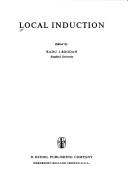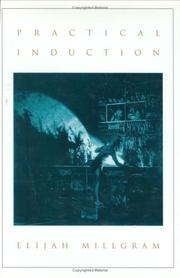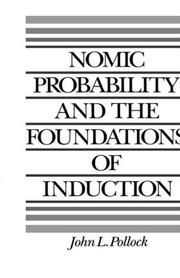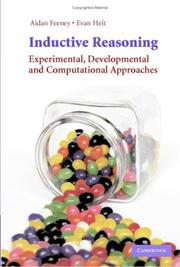| Listing 1 - 10 of 68 | << page >> |
Sort by
|
Book
ISBN: 0511734336 1108019242 Year: 2011 Publisher: Cambridge : Cambridge University Press,
Abstract | Keywords | Export | Availability | Bookmark
 Loading...
Loading...Choose an application
- Reference Manager
- EndNote
- RefWorks (Direct export to RefWorks)
A central figure in Victorian science, William Whewell (1794-1866) held professorships in Mineralogy and Moral Philosophy at Trinity College, Cambridge, before becoming Master of the college in 1841. His mathematical textbooks, such as A Treatise on Dynamics (1823), were instrumental in bringing French analytical methods into British science. This three-volume history, first published in 1837, is one of Whewell's most famous works. It provides a history of the physical sciences that culminates with the mechanics, astronomy, and chemistry of 'modern times'. Volume 1 studies Greek physics and metaphysics, attributing their failure to a method that derived its principles from the common use of language. It surveys the state of the physical sciences in the middle ages, and deals with the rise of 'formal' astronomy, based on observation rather than calculation, as exemplified by Copernicus.
Induction (Logic) --- Inductive logic --- Logic, Inductive --- Logic --- Reasoning
Book
ISBN: 0511734344 1108019250 Year: 2011 Publisher: Cambridge : Cambridge University Press,
Abstract | Keywords | Export | Availability | Bookmark
 Loading...
Loading...Choose an application
- Reference Manager
- EndNote
- RefWorks (Direct export to RefWorks)
A central figure in Victorian science, William Whewell held professorships in Mineralogy & Moral Philosophy at Trinity College, Cambridge, before becoming Master of the college in 1841. His mathematical textbooks, such as A Treatise on Dynamics, were instrumental in bringing French analytical methods into British science. This three-volume history, first published in 1837, is one of Whewell's most famous works. It provides a history of the physical sciences that culminates with the mechanics, astronomy, & chemistry of 'modern times'. Volume 2 focuses on the rise & development of modern mechanics in the 17th century. Whewell shows how Galileo's laws of motion exemplify a paradigmatic shift from 'formal' to 'physical' sciences - a new approach concerned with explaining causes rather than merely observing phenomena. It also discusses the implications for physical astronomy of Newton's discoveries.
Induction (Logic) --- Inductive logic --- Logic, Inductive --- Logic --- Reasoning
Book
ISBN: 9780199666478 Year: 2017 Publisher: Oxford Oxford University Press
Abstract | Keywords | Export | Availability | Bookmark
 Loading...
Loading...Choose an application
- Reference Manager
- EndNote
- RefWorks (Direct export to RefWorks)
Logic is a field studied mainly by researchers and students of philosophy, mathematics and computing. Inductive logic seeks to determine the extent to which the premises of an argument entail its conclusion, aiming to provide a theory of how one should reason in the face of uncertainty. It has applications to decision making and artificial intelligence, as well as how scientists should reason when not in possession of the full facts. In this work, Jon Williamson embarks on a quest to find a general, reasonable, applicable inductive logic (GRAIL), all the while examining why pioneers such as Ludwig Wittgenstein and Rudolf Carnap did not entirely succeed in this task.
Induction (Logic). --- Induction (Logic) --- Inductive logic --- Logic, Inductive --- 510.6 --- 510.6 Mathematical logic --- Mathematical logic
Book
ISBN: 0262039729 0262352443 9780262352444 9780262039727 0262352451 Year: 2019 Publisher: Cambridge, Massachusetts : The MIT Press,
Abstract | Keywords | Export | Availability | Bookmark
 Loading...
Loading...Choose an application
- Reference Manager
- EndNote
- RefWorks (Direct export to RefWorks)
A new approach to Hume's problem of induction that justifies the optimality of induction at the level of meta-induction. Hume's problem of justifying induction has been among epistemology's greatest challenges for centuries. In this book, Gerhard Schurz proposes a new approach to Hume's problem. Acknowledging the force of Hume's arguments against the possibility of a noncircular justification of the reliability of induction, Schurz demonstrates instead the possibility of a noncircular justification of the optimality of induction, or, more precisely, of meta-induction (the application of induction to competing prediction models). Drawing on discoveries in computational learning theory, Schurz demonstrates that a regret-based learning strategy, attractivity-weighted meta-induction, is predictively optimal in all possible worlds among all prediction methods accessible to the epistemic agent. Moreover, the a priori justification of meta-induction generates a noncircular a posteriori justification of object induction. Taken together, these two results provide a noncircular solution to Hume's problem. Schurz discusses the philosophical debate on the problem of induction, addressing all major attempts at a solution to Hume's problem and describing their shortcomings; presents a series of theorems, accompanied by a description of computer simulations illustrating the content of these theorems (with proofs presented in a mathematical appendix); and defends, refines, and applies core insights regarding the optimality of meta-induction, explaining applications in neighboring disciplines including forecasting sciences, cognitive science, social epistemology, and generalized evolution theory. Finally, Schurz generalizes the method of optimality-based justification to a new strategy of justification in epistemology, arguing that optimality justifications can avoid the problems of justificatory circularity and regress.
Induction (Logic) --- Hume, David, --- Inductive logic --- Logic, Inductive --- Logic --- Reasoning --- Hume, David

ISBN: 3168382124 3168382116 9783168382119 9783168382126 Year: 1979 Volume: 18 Publisher: Tübingen Mohr
Abstract | Keywords | Export | Availability | Bookmark
 Loading...
Loading...Choose an application
- Reference Manager
- EndNote
- RefWorks (Direct export to RefWorks)
Theory of knowledge --- Knowledge, Theory of --- Induction (Logic) --- Experience --- Philosophy --- Psychology --- Reality --- Pragmatism --- Inductive logic --- Logic, Inductive --- Logic --- Reasoning --- Epistemology

ISBN: 9027706492 9401198012 9401197997 9789027706492 Year: 1976 Volume: 93 Publisher: Dordrecht
Abstract | Keywords | Export | Availability | Bookmark
 Loading...
Loading...Choose an application
- Reference Manager
- EndNote
- RefWorks (Direct export to RefWorks)
Logic --- Induction (Logic) --- -Inductive logic --- Logic, Inductive --- Reasoning --- Addresses, essays, lectures --- -Addresses, essays, lectures --- Induction (Logic). --- Inductive logic

ISBN: 0674695976 Year: 1997 Publisher: Cambridge (Mass.): Harvard university press
Abstract | Keywords | Export | Availability | Bookmark
 Loading...
Loading...Choose an application
- Reference Manager
- EndNote
- RefWorks (Direct export to RefWorks)
Induction (Logic) --- Reasoning. --- Induction (Logic). --- Reasoning --- Argumentation --- Ratiocination --- Inductive logic --- Logic, Inductive --- Reason --- Thought and thinking --- Judgment (Logic) --- Logic

ISBN: 0197560121 1280524162 9786610524167 1423734688 0195345215 160256602X 9781423734680 9781602566026 9780195060133 019506013X 9781280524165 019506013X Year: 1990 Publisher: New York Oxford University Press
Abstract | Keywords | Export | Availability | Bookmark
 Loading...
Loading...Choose an application
- Reference Manager
- EndNote
- RefWorks (Direct export to RefWorks)
In this text, John L. Pollock examines the subject of probabilistic reasoning, making general philosophical sense of objective probabilities and exploring their relationship to the problem of induction. His main claim is that the fundamental notion of probability is nomic - that is, it involves the notion of natural law, valid across all possible worlds.
Probabilities. --- Induction (Logic) --- Inductive logic --- Logic, Inductive --- Logic --- Reasoning --- Probability --- Statistical inference --- Combinations --- Mathematics --- Chance --- Least squares --- Mathematical statistics --- Risk
Book
ISBN: 1783265094 9781783265091 9781783265084 1783265086 Year: 2014 Publisher: Hackensack, NJ
Abstract | Keywords | Export | Availability | Bookmark
 Loading...
Loading...Choose an application
- Reference Manager
- EndNote
- RefWorks (Direct export to RefWorks)
This book represents a selection of papers presented at the Inductive Logic Programming (ILP) workshop held at Cumberland Lodge, Great Windsor Park. The collection marks two decades since the first ILP workshop in 1991. During this period the area has developed into the main forum for work on logic-based machine learning. The chapters cover a wide variety of topics, ranging from theory and ILP implementations to state-of-the-art applications in real-world domains. The international contributors represent leaders in the field from prestigious institutions in Europe, North America and Asia.Graduate students and researchers in this field will find this book highly useful as it provides an up-to-date insight into the key sub-areas of implementation and theory of ILP. For academics and researchers in the field of artificial intelligence and natural sciences, the book demonstrates how ILP is being used in areas as diverse as the learning of game strategies, robotics, natural language understanding, query search, drug design and protein modelling.
Logic programming. --- Induction (Logic) --- Machine learning. --- Computer programming --- Learning, Machine --- Artificial intelligence --- Machine theory --- Inductive logic --- Logic, Inductive --- Logic --- Reasoning

ISBN: 9780511619304 9780521856485 9780521672443 9780511342844 0511342845 9780511340093 0511340095 0511619308 1107177049 1281085405 9786611085407 0511342314 0511341792 0511341210 0511568614 0521856485 0521672449 Year: 2007 Publisher: Cambridge New York Cambridge University Press
Abstract | Keywords | Export | Availability | Bookmark
 Loading...
Loading...Choose an application
- Reference Manager
- EndNote
- RefWorks (Direct export to RefWorks)
Without inductive reasoning, we couldn't generalize from one instance to another, derive scientific hypotheses, or predict that the sun will rise again tomorrow morning. Despite the widespread nature of inductive reasoning, books on this topic are rare. Indeed, this is the first book on the psychology of inductive reasoning in twenty years. The chapters survey recent advances in the study of inductive reasoning and address questions about how it develops, the role of knowledge in induction, how best to model people's reasoning, and how induction relates to other forms of thinking. Written by experts in philosophy, developmental science, cognitive psychology, and computational modeling, the contributions here will be of interest to a general cognitive science audience as well as to those with a more specialized interest in the study of thinking.
Reasoning (Psychology) --- Induction (Logic) --- Inductive logic --- Logic, Inductive --- Logic --- Reasoning --- Thought and thinking --- Health Sciences --- Psychiatry & Psychology
| Listing 1 - 10 of 68 | << page >> |
Sort by
|

 Search
Search Feedback
Feedback About UniCat
About UniCat  Help
Help News
News